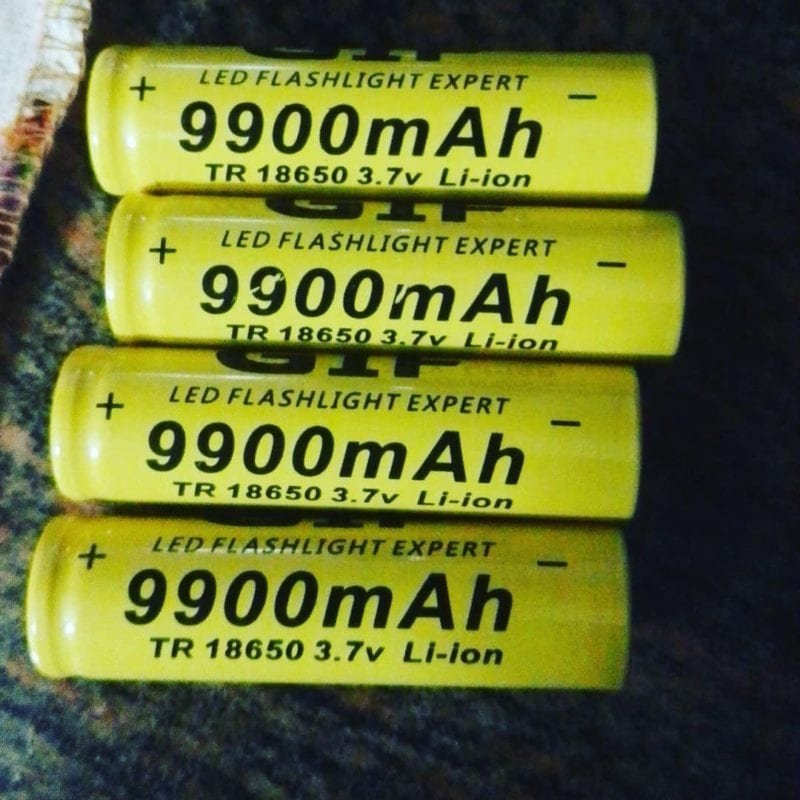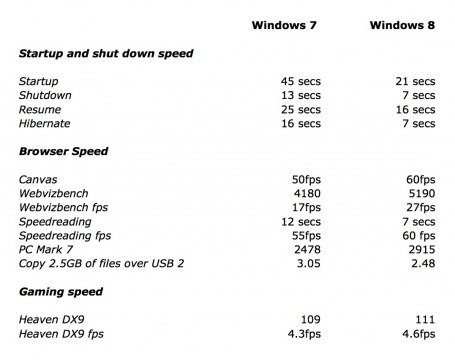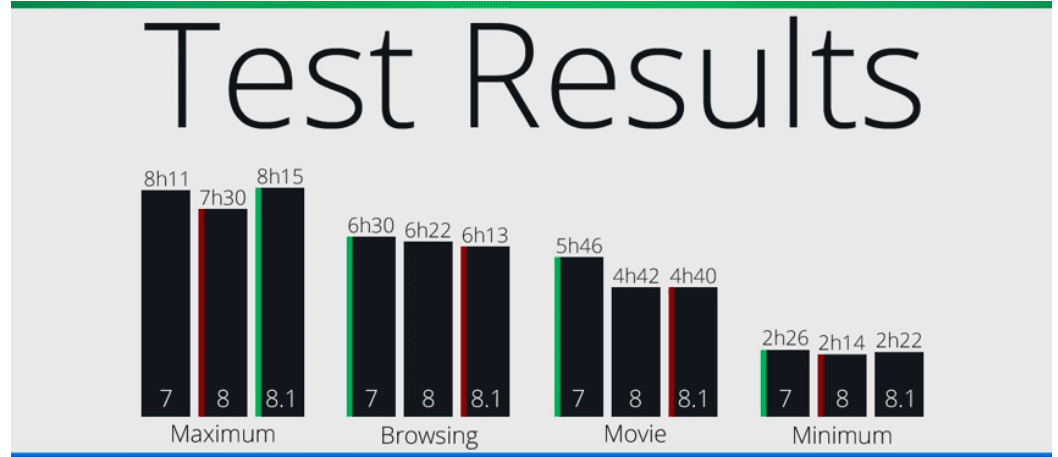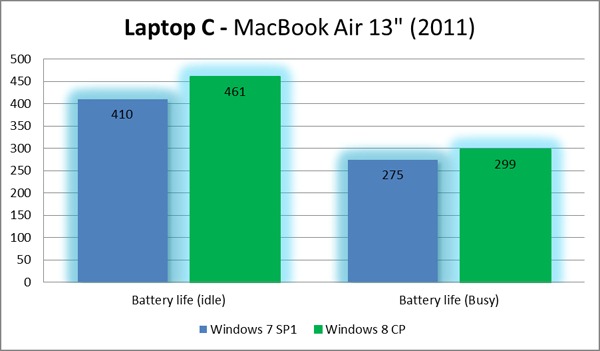On July 29, 2015 Windows 10 was released to the general public. It is an high-end operating system with lot of provision for graphics, universal apps, tasks, background processes, new edge browser and many other features.
There are different upgrades in the form of 1903, 1909, 2004 and 20H2. During Windows 10 updates there is more power usage and lot of battery drain.

Windows 10 vs Windows 7 Performance
In Nov 2015, a laptop which would give 2-3 hours of battery life reduced in performance to 1 hour after installing Windows 10. There is almost a reduction of 40 to 50% in the initial days.
The battery life of Windows 10 had the following benchmarks on different laptops.
2. Acer Aspire V5 – 3 hour 28 minutes
3. Dell Inspiron 17 – 3 hour 29 min.
In most of the above case, battery life was better than Windows 8.1. According to this reddit post (https://www.reddit.com/r/Windows10/comments/2wru9a/windows_7_vs_windows_10mobility_and_battery_life/), 8.1 was having 20 to 30% bettery battery period then 7. In that context, Windows 10 should be far better enough than 7 in 2019.
The following battery life benchmarks were noticed in a gizmodo.com article for Windows 10.
2. Dell XPS 13 – 5 hrs, 6.5 hrs (with different resolution)
3. Lenovo ThinkPad X240 – 10 hrs (without using LTE mode)
Compared to Windows 8.1, these were little better. So it should show better battery performance vs Windows 7.
Windows 7 vs Windows 8 Performance
Battery life is point of comparison in Windows 8.1 vs Windows 7 battle, when you don’t have nearby power supply. With the improvement of hardware like CPU, Graphics card, Ethernet cards etc, you should see improved laptop standby time on battery.
Are you curious to know the speed benchmarks in the Windows 8 vs Windows 7 performance battle? See this infographic and get an answer!

[Source : gadgetmix.com]
Windows 7 vs Windows 8.1 Performance
On notebookreview.com forums, a user tested the battery life of Windows 7 vs Windows 8.1 on his Samsung laptop model NP900X3C.
The typical configuration looked like this.
Processor Support Intel Core i5 Processor 3317U (1.7GHz, 3MB L3 Cache)
Chipset Intel
RAM Size 4 GB
Type DDR3 (1600 MHz)
Slots 1
Screen 13.3″ SuperBright 400nit HD+ LED Display (1,600 x 900), Anti-Reflective
Graphics Controller Intel HD Graphics 4000
Sound Controller High Definition Audio
Speakers 3W Stereo Speaker (1.5 W x 2)
Wi-Fi & Bluetooth = Disabled
Email Client used = Refresh interval of 10 minutes
Windows 7 is more likely to consume more power than 8 and 8.1. This is because of extra power management features of the later. But a ThinkPad is said to give only half-life of 4 hours instead of the advertised 8 hours on 8.1.
Windows 7 vs 8.1
But when the laptop was tested running a movie, Windows 7 lasted 1 hour 6 minutes more.

Windows 8 vs Windows 7
Earlier in Feb, 2012. end, “ITWorld” came up with a review on Windows 8 Consumer Preview battery life performance.
It tested variety of laptops and compared Windows 7 SP1 & Windows 8 CP in terms of power consumption. For the test they used 3 laptops. The results were impressive from Windows 8 point of view when measured with the PCMark 7’s “Lightweight” test.

According to “TomsGuide” the significant improvement in Windows 8 is its battery life compared to Windows 7 without reduction in performance.
The battery life was tested in normal use, with a mix of editing documents, reading Web pages, playing games, editing photos and streaming videos in desktop mode.
The test didn’t use Metro apps in order to a proper comparison with Windows 7.

Reasons behind inconclusive battery life
Windows 10 is notorious to install lot of apps which may not be required. These can drain lot of battery life if not stopped. They run in the background without any user involvement.
Since Windows 7 does not have any “apps” concept, you are better at saving precious battery time. But it is an outdated OS, which is less likely to have updates in the future. Old Programs which install bloatware and adware can ruin the battery life.
Windows 7 was released in 2009 and most of the hardware bought at that time, would have less performance compared to 2019. In recent times, we could see the emergence of eigth generation i7, i5 processors. In addition to that we have SSD (Solid State Drives) which have replaced HDD.
Updates also play a major role in battery life. If wrong graphics driver is installed, it would take more power than usual. In the same way, if third-party applications from wrong sources are downloaded, they may take up battery life for unknown reasons.
Software and Hardware Reasons
Also, people who have upgraded to Windows 10 might be using new hardware. This includes more powerful battery. Just like your mobile phone, a more strong battery has more power and lasts long.
In the Windows 10 vs Window 7 battery struggle, one can check the benchmarks on similar hardware. Then only you can decide which OS is the best. Most of the manufacturer of old hardware released Windows 7 drivers, but only some have given Windows 10.
A driver package for Windows 7 would not be optimized for Windows 10. This is becaused the SDK for both the OS has changed and developers might have used different API for Windows 7.

Wi-Fi and Networking Impact on Battery Life
In Windows 10 days, you have provision for connecting Wi-Fi, Bluetooth and many other radio devices. These such lot of battery life based upon the type of devices. If you using cheap China device, they may work well. But in the long run, battery life will not last long.
Also special features of Windows 10 like virtual desktops, XBox Networking, GameBar, YourPhone are resource intensive and can take power.
The type of browser you use also has an impact on battery life. In Windows 10 you have Microsoft Edge which is more battery friendly and quick. This is not supported in Windows 7.
In the 1903 version of Windows 10, more apps are optimized for battery life compared to the 1703 or 1803 version. The life-cycle of a battery is also important. After 4 years or so, your battery may be dying.
Small settings can have a huge boost on the battery time of a single session. If you turn off your hard-disk and screen after 10 to 20 minutes, instead of 2 hours, could extend battery life.
Conclusion
Under Wireless Adapter Settings in Windows 10, you have 4 different settings for Power Saving Mode. These include 1. Low Power Saving 2. Medium Power Saving 3. Maximum Power Saving 4. Maximum Performance. If the battery power is coming to an end like 10 to 20%, you can set the parameters to low or medium.
Using the Sleep option, you can set the hybrid sleep and hibernate after specified period of time. This makes sure, that your laptop power is optimized when you are not using it.
To end the article, screen brightness plays a major role in the Windows 10 vs Windows 7 battery life comparison. A similar laptop with two different resolutions on the same OS, show markup difference in battery life timings.
Also Updates when installing put pressure on the CPU, which will take more power. Due to these reasons, it is difficult to come to a conclusive battery life for either Windows 10 or Windows 7 on the same laptop.

It seems to be a Helpful Article on Saving Laptops Power source !!! I would Like to have a Conclusion that windows 8 is a Highly recommended OS for Efficient battery Backup !!!
This is indeed a great post on the battery life of laptops. Pretty useful I must say!